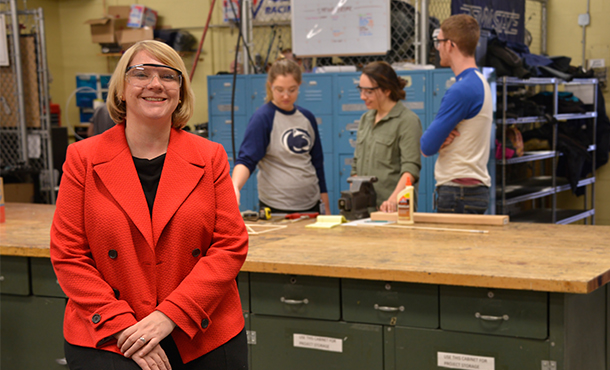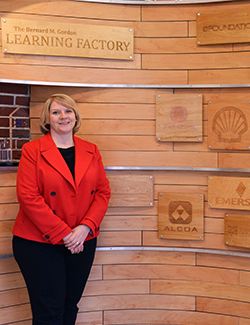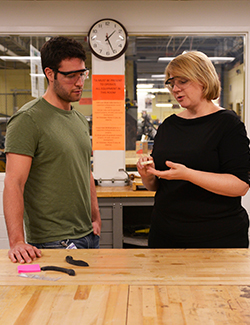
Maggie Slattery, assistant professor of biomedical engineering, has recently been named director of the Bernard M. Gordon Learning Factory. In the new role, Slattery seeks to create new innovation and expansion to benefit Penn State students
Slattery embraces new challenges and opportunities as director of the Bernard M. Gordon Learning Factory
03/22/2016
When it comes to pushing the envelope on undergraduate education, few faculty members are as active as Maggie Slattery, assistant professor of biomedical engineering.
A Penn State faculty member since 2007, Slattery has been heavily involved in the undergraduate arena, serving in a variety of capacities and contributing to a number of new ideas and discoveries.
Currently, she serves as the undergraduate program coordinator for the Department of Biomedical Engineering, and is a member of the Penn State Faculty Senate’s Special Committee on Implementation of the General Education Reform. She has served as co-chair for the Penn State General Education Task Force, and most recently, has added the title, director of the Bernard M. Gordon Learning Factory, to the list.
“I’m incredibly grateful for this opportunity and look forward to serving the college in such a important role,” Slattery said. “By strengthening and curating new relationships with potential industry partners, I am in a position to positively impact undergraduate innovation, and build a platform on which we can broadcast our successes.”
As director, Slattery will serve as the point of contact for the college amongst industry collaborators, facilitating practical hands-on experiences to engineering students through industry-sponsored and client-based capstone design projects. She succeeds Mary Frecker, professor of mechanical engineering, in the role.
While Slattery credits a wide range of experiences that prepared her for the position, she notes that her background in coordinating student capstone projects was perhaps the most vital.
“As capstone coordinator I was responsible for making sure we had enough projects for our students, talking to potential sponsors, and serving as a liaison between students, educators, and industry, Slattery said. “Ultimately, I am continuing to do all of those things but at a much higher level.”
In addition to promoting new relationships outside of Penn State, Slattery is also hopeful that the Learning Factory will see new advancement and expansion during her tenure, and in the years to come.
One idea she and her colleagues have discussed is to expand the range of projects offered beyond the traditional senior-level undergraduate scope. This would mean creating new opportunities for M.S. students in the College of Engineering, as well as engineers in their first and second years of study.
Ultimately, however, Slattery’s primary goal continues to be ensuring that new discovery among young minds at Penn State is not wasted, by offering the encouragement, support, and facilities needed by students.
“The sphere of undergraduate innovation at Penn State is possibly one of the least explored,” Slattery said. “Building upon the ideas of Invent Penn State and the Lion Launch Pad, I would like the see the Learning Factory become a place where all of these ideas, so ripe for development, have a chance to come to life.”






